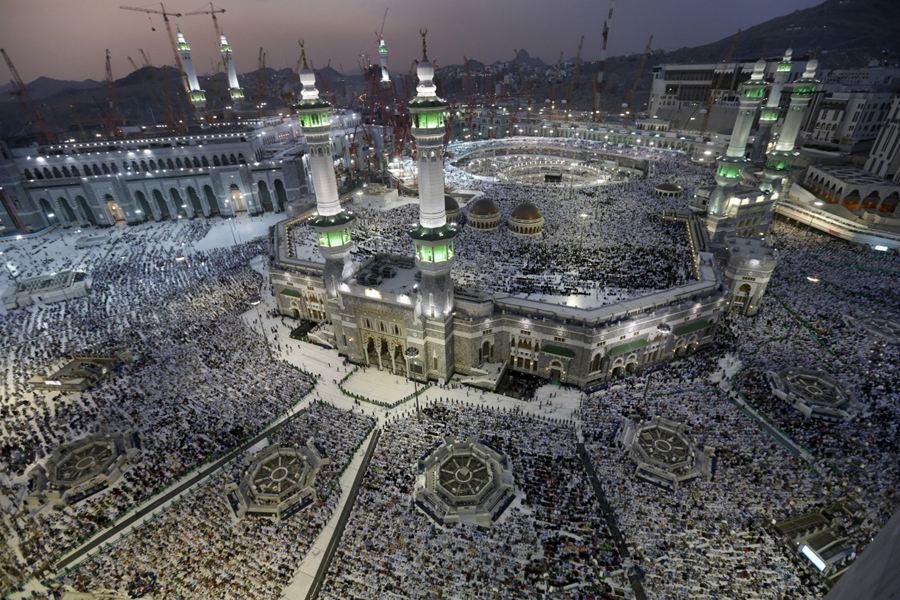Every Muslim is required to make a pilgrimage (during Hajj) to Mecca at least once in a lifetime, if he or she is physically and financially able to do so. During Hajj, all Muslims, be they kings or paupers, are equal, each person wearing two simple white sheets with nothing to distinguish between ruler and subject and rich and poor.
The Al-Saud, the conquerors and rulers of Arabia, have used their own interpretation of Islam in an attempt to legitimize their rule and manage, or more accurately mismanage, Islam’s holiest sites. Since 1986, the kings of Saudi Arabia have unilaterally adopted the title “Custodian of the Two Holy Mosques,” a title that was also used by Ottoman caliphs. Saudi Arabia is a country that has no constitution but claims the Quran for its constitution. Does Al-Saud rule reflect Islamic teachings from the Quran and are the Al-Saud the sole and rightful custodians of Islam’s holiest sites?
Saudi Arabia is a country where the rulers have been the principal backers of Muslim extremists affiliated with Al-Qaeda and ISIS although Islam condemns violence and murder, where churches or synagogues are prohibited although Islam preaches freedom of religion, where rulers live in unimaginable luxury while Islam prohibits opulent lifestyles, where there is an extreme inequality of wealth while Islam prohibits the hoarding of wealth and sanctions large divergences in wealth and income, where the rulers’ wealth comes largely from corruption and the exploitation of oil while Islam condemns corruption and preaches that mineral wealth belongs equally to all members of all generations, and where the rulers rule by fiat and oppression while Islam preaches that rulers are to be the most rule-abiding members of the community and must have the concurrence of their community for their rule. It is difficult to call the King of Saudi Arabia a rule-abiding Muslim ruler and the rightful “Custodian of the Two Holy Mosques.” And don’t forget, it is Al-Saud rule that spawned Al-Qaeda and the 9/11 terrorists.
But in the last 30 or so years, Al-Saud claim to the sole guardianship of the “Two Holy Mosques” must be further questioned because of the mismanagement of the holy mosques. Since 1990, several thousand pilgrims have died in Mecca-Medina in stampedes and from the collapse of infrastructure and construction equipment. But there is more. Mecca is rich with nearly 1400 years of Islamic history. In recent years, the Al-Saud have demolished many of the historical sites of Islam and have replaced them with buildings that dwarf the Kaaba and with hotels where the homes of the Prophet Mohammad’s companions once stood. During Hajj all Muslims are presumed to be equal, but in recent years inequalities are increasingly on display everywhere. Saudi kings have built palaces overlooking the Kaaba and rich pilgrims enjoy luxurious living at hotels such as the Royal Fairmont Clocktower in $3,000-a-night rooms that overlook the Kaaba while poor Muslims get by with minimal accommodations. When pilgrims become so unequal during Hajj—where equality is to be supreme—Muslims know all that they need know that the rule non-compliance has reached a zenith and that Al-Saud rule does not reflect the teachings of Islam, something that they proclaim for legitimacy.
The demolishing and rebuilding of Mecca and Medina has afforded the ruling family and well-connected Saudis enormous wealth through escalating land prices and higher expenditures for luxury by wealthy pilgrims. Destroying Islamic heritage sites and turning Mecca into a commercial glitzy moneymaking fairground to benefit the Al-Saud and their cronies is an affront to the world’s 1.7 billion Muslims.
Does the King of Saudi Arabia, one man among 1.7 billion Muslims, have the right to do as he wishes with Islam’s holy sites? Is it seemly to use Islam’s holy sites for profiteering? Should the world’s 1.7 billion Muslims have a say in how these sites are managed?
It is high time to protect Islam’s holiest sites and Islam’s heritage from financial exploitation and to designate Mecca and Medina “Muslim-administered cities” with their administration in the hands of a representative and elected committee of Muslims whose duties should be to protect these mosques and the Islamic heritage of the region, and to ensure safe and equal access to all Muslims.
/106

